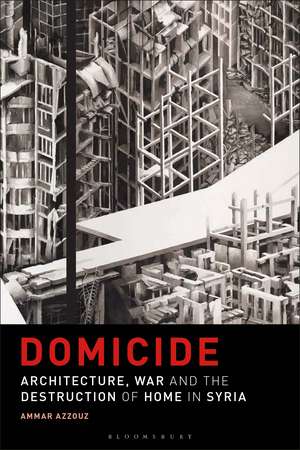Domicide: Architecture, War and the Destruction of Home in Syria
Autor Dr Ammar Azzouzen Limba Engleză Hardback – 9 aug 2023
Preț: 510.68 lei
Preț vechi: 731.36 lei
-30% Nou
Puncte Express: 766
Preț estimativ în valută:
97.72€ • 106.48$ • 82.34£
97.72€ • 106.48$ • 82.34£
Carte indisponibilă temporar
Doresc să fiu notificat când acest titlu va fi disponibil:
Se trimite...
Preluare comenzi: 021 569.72.76
Specificații
ISBN-13: 9781350248106
ISBN-10: 135024810X
Pagini: 176
Ilustrații: 21 bw illus
Dimensiuni: 156 x 234 mm
Greutate: 0.52 kg
Editura: Bloomsbury Publishing
Colecția Bloomsbury Visual Arts
Locul publicării:London, United Kingdom
ISBN-10: 135024810X
Pagini: 176
Ilustrații: 21 bw illus
Dimensiuni: 156 x 234 mm
Greutate: 0.52 kg
Editura: Bloomsbury Publishing
Colecția Bloomsbury Visual Arts
Locul publicării:London, United Kingdom
Caracteristici
To date, there is no book that covers a wide range of interviews with architects and locals living inside Syria or other contested cities in the region (i.e. Libya, Iraq or Yemen). This book brings fresh insights to the role of architects at the time of war, and the opportunities to support them remotely in their struggle to respond to the crisis
Notă biografică
Ammar Azzouz is a British-Syrian architect and architectural critic. He is a Research Fellow at the University of Oxford, UK. A researcher and writer on issues of architecture and war, reconstruction, and resilience, his research on Syria has been published with the New York Times, LSE Middle East Blog, the Independent, the New Statesman, the Global Construction Review, CITY and the City Metric.
Cuprins
AcknowledgementsForeword, by Lyse DoucetPrefaceIntroduction1. Domicide: Slow violence, division and destruction2. War on home: In search of a place to call home3. Domicide and representation4. Domicidal reconstruction5. Domicide in war and peaceBibliography
Recenzii
A deeply moving and clear eyed account of the Syrian conflict from a scholar who has lived its harsh realities on the ground and in exile. Domicide dispels the fiction of a post-conflict Syria, reminding us that the violence continues unabated, just in different configurations, in the wake of war. Azzouz poignantly describes how predatory states weaponize urban reconstruction, enacting new waves of violence in an effort to re-write history and erase communities. Moving us away from the endless mourning of monumental destruction, Domicide tells the bigger story of loss, the deliberate destruction of home. An important book that impels readers to rethink the entire category and contradictions of heritage work that will uncomfortably challenge all of us seeking to capture a world of conflict.
A harrowing account of everyday violence in contemporary Syria. Azzouz painfully narrates the displacement, dispossession, and compounded grief that Syrians have endured with the loss of home and the social and material fabric that holds it together. In Domicide, we see how Syrians have reimagined and recreated home, against all odds, both inside Syria and in exile. A timely and must-read book.
A passionate and informed analysis of the deliberate policy pursued by the Asad regime in destroying the built environment of Homs and other Syrian cities. Azzouz's narrative bears witness to this policy of domicide and also to the courage and dignity with which Homsis defend their city and reconstruct its memory.
An important contribution to studies of the human costs of the ongoing Syrian civil war ... [and] a call to action, for the clarity Azzouz lays bare of the systematic and deliberate way Homs has been targeted will inspire a new wave of resilience, and the will to rebuild better.
A harrowing account of everyday violence in contemporary Syria. Azzouz painfully narrates the displacement, dispossession, and compounded grief that Syrians have endured with the loss of home and the social and material fabric that holds it together. In Domicide, we see how Syrians have reimagined and recreated home, against all odds, both inside Syria and in exile. A timely and must-read book.
A passionate and informed analysis of the deliberate policy pursued by the Asad regime in destroying the built environment of Homs and other Syrian cities. Azzouz's narrative bears witness to this policy of domicide and also to the courage and dignity with which Homsis defend their city and reconstruct its memory.
An important contribution to studies of the human costs of the ongoing Syrian civil war ... [and] a call to action, for the clarity Azzouz lays bare of the systematic and deliberate way Homs has been targeted will inspire a new wave of resilience, and the will to rebuild better.
